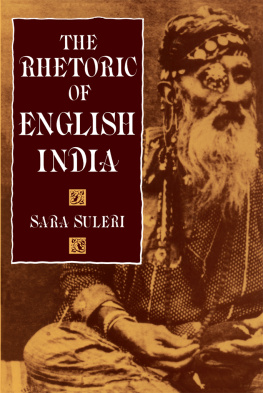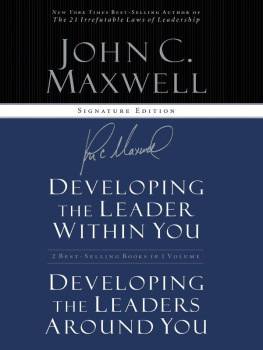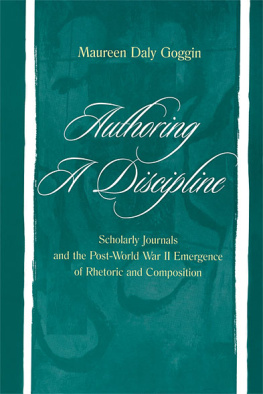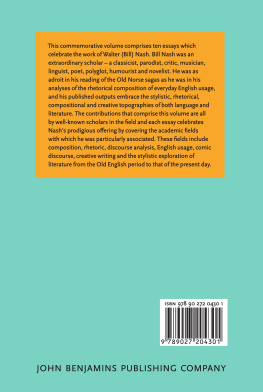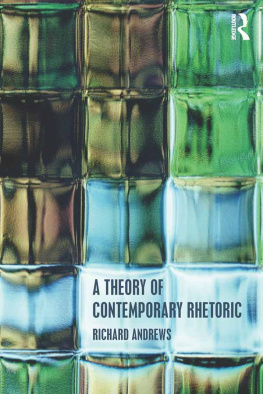Jason Maxwell - The Two Cultures of English: Literature, Composition, and the Moment of Rhetoric
Here you can read online Jason Maxwell - The Two Cultures of English: Literature, Composition, and the Moment of Rhetoric full text of the book (entire story) in english for free. Download pdf and epub, get meaning, cover and reviews about this ebook. City: Canada., United States., year: 2019, publisher: Fordham University Press, genre: Science. Description of the work, (preface) as well as reviews are available. Best literature library LitArk.com created for fans of good reading and offers a wide selection of genres:
Romance novel
Science fiction
Adventure
Detective
Science
History
Home and family
Prose
Art
Politics
Computer
Non-fiction
Religion
Business
Children
Humor
Choose a favorite category and find really read worthwhile books. Enjoy immersion in the world of imagination, feel the emotions of the characters or learn something new for yourself, make an fascinating discovery.

- Book:The Two Cultures of English: Literature, Composition, and the Moment of Rhetoric
- Author:
- Publisher:Fordham University Press
- Genre:
- Year:2019
- City:Canada., United States.
- Rating:4 / 5
- Favourites:Add to favourites
- Your mark:
- 80
- 1
- 2
- 3
- 4
- 5
The Two Cultures of English: Literature, Composition, and the Moment of Rhetoric: summary, description and annotation
We offer to read an annotation, description, summary or preface (depends on what the author of the book "The Two Cultures of English: Literature, Composition, and the Moment of Rhetoric" wrote himself). If you haven't found the necessary information about the book — write in the comments, we will try to find it.
Jason Maxwell: author's other books
Who wrote The Two Cultures of English: Literature, Composition, and the Moment of Rhetoric? Find out the surname, the name of the author of the book and a list of all author's works by series.
The Two Cultures of English: Literature, Composition, and the Moment of Rhetoric — read online for free the complete book (whole text) full work
Below is the text of the book, divided by pages. System saving the place of the last page read, allows you to conveniently read the book "The Two Cultures of English: Literature, Composition, and the Moment of Rhetoric" online for free, without having to search again every time where you left off. Put a bookmark, and you can go to the page where you finished reading at any time.
Font size:
Interval:
Bookmark:
THE TWO CULTURES OF ENGLISH
The Two Cultures of English
LITERATURE, COMPOSITION, AND THE MOMENT OF RHETORIC
JASON MAXWELL
FORDHAM UNIVERSITY PRESS
New York 2019
Copyright 2019 Fordham University Press
All rights reserved. No part of this publication may be reproduced, stored in a retrieval system, or transmitted in any form or by any meanselectronic, mechanical, photocopy, recording, or any otherexcept for brief quotations in printed reviews, without the prior permission of the publisher.
Fordham University Press has no responsibility for the persistence or accuracy of URLs for external or third-party Internet websites referred to in this publication and does not guarantee that any content on such websites is, or will remain, accurate or appropriate.
Fordham University Press also publishes its books in a variety of electronic formats. Some content that appears in print may not be available in electronic books.
Visit us online at www.fordhampress.com.
Library of Congress Cataloging-in-Publication Data
available online at https://catalog.loc.gov.
Printed in the United States of America
21 20 19 5 4 3 2 1
First edition
CONTENTS
THE TWO CULTURES OF ENGLISH
Included in Vincent B. Leitchs 2014 book Literary Criticism in the 21st Century is a map that usefully organizes the unmasterable sprawl of various fields and subdisciplines in contemporary English studies. As a way of illustrating an emerging theory renaissance (8), Leitchs map is structured by a dozen major topics with an array of subfields clustered around each one. So, for instance, the major topic Globalization is surrounded by six satellites, including Empire, Postcolonial Studies, Diaspora Studies, Multiculturalism, and New American Studies. Another major topic, Affect Studies, includes the satellites Affect Theory, Testimony, Sentimentality, Trauma Studies, Memory Studies, and Holocaust Studies. The map offers a more robust, variegated understanding of the discipline than one gets from a strict periodization model (Early Modern, 18th-century British, American Modernism); it also underscores how Theory has undergone a significant transformation. Whereas in the final decades of the twentieth-century theory consisted of a range of competing schools and movements (queer theory, Marxism, psychoanalysis, formalism, New Historicism), a model that unfortunately invites comparisons to a buffet, today theory has infiltrated and reshaped the older period groupings, and as a result it exists everywhere and nowhere (8). As Leitch explains, theory now occupies the role of regular practice, serving as a secondary but indispensable strength (9) for navigating both long established and emerging fields (some of these fields in fact developed because of crucial critical interventions during the theory era).
Although Leitch clarifies that the ninety-four subdisciplines and fields that constitute the map can change spheres and fuse into original combinations, his provisional arrangement raises at least one curious point of complication. If one were to use the map as a way of diagnosing the distribution of area groups in English today, one would rightly come away with a sense of the wild diversity of approaches and topics the discipline has to offer. However, the map would provide little in the way of knowing the relative density, in terms of either publications or faculty specializations, of any of these areas. Much as a quick glance at an electoral college map can give a skewed sense of the outcome of an American presidential election, where Montana dwarfs Rhode Island in size even though both states have roughly the same population, Leitchs map doesnt register where certain critical masses may have formed. Of course, Leitch never declared that this was an intention of his schematic, and any attempt to conduct such a project would be complicated by the aforementioned cross-pollination among the fields. Nevertheless, this more than pardonable flaw of the map can be used to emphasize the explosive growth of the area group Rhetoric and Composition, which roughly corresponds to one of Leitchs twelve planets. Looking at recent job trends provided by the MLA, Rhetoric and Composition has notched roughly 30 percent of the positions advertised each year on the Job Information List (JIL). For example, of the 1,621 jobs advertised in the English JIL for 20002001, a whopping 30.8 percent were in the area group, matching the entirety of British literature positions (all periods) and outpacing American literature (27 percent). The numbers have remained remarkably consistent over the last decade and a half: in 20122013, Rhetoric and Composition counted for 28.9 percent of the advertisements, while British literature received 28.4 percent and American literature received 25 percent.
While examining the MLAs JIL annual report, one might notice that the graph labels the category Composition and Rhetoric, reversing the order in which Ive arranged the two terms. Although Rhetoric and Composition has historically served as the preferred nomenclature, the reversed order has recently gained prominence. Elsewhere, the field is simply referred to as Composition Studies, apparently feeling no obligation to rhetoric whatsoever (I imagine that, if polled, more professors in the Complicating matters further, the titles Rhetoric and Writing and Writing and Rhetoric have also gained currency in the last decade or so, which would suggest some uneasiness surrounding the term composition. Writing Studies, less common but still in circulation, abandons the two historically significant terms altogether, the generality of its name hinting at previously unexplored territories. The high degree of variation in the name of this field only confirms Leitchs assertion that subdisciplines have a tendency to change spheres and fuse into original combinations.
But is the volatility surrounding the name a mere trifle or symptomatic of significant underlying tensions? As a way to begin answering that question, we might return to Leitchs map and note that the major topic that corresponds to Rhetoric and Composition is labeled Rhetoric, with Composition Studies as one of its satellites (the others being Literacy Studies, Discourse Analysis, History of Rhetoric, Tropology, Orality, Cognitive Poetics, and Reception Studies). It would lead us astray to dwell too long on the associations between the eight subfields assembled by Leitch here.with rhetoric, a practice that can be traced back to the agora of ancient Greece, where dignified statesman implored their fellow citizens on matters of common concern. If rhetoric in antiquity was an elevated form of discourse reserved for individuals with stature, much of that dignity is preserved in the modern era by treating it as an area of academic inquiry. To examine rhetoric as an object of serious theoretical interest means placing it in the realm of professionalized activity, and therefore always a step or two removed from more mundane, clerical concerns. Just think of the stereotype of the academic researcher, who is always more interested in completing the next book or securing the next grant than in teaching under graduates or grading their assignments. To privilege rhetoric over composition, or vice versa, then, is to make a series of judgments concerning the relationship between theory and practice, tradition and innovation, and professionalism and pedagogy, judgments that are almost guaranteed to please some and rankle others.
Certainly those judgments have been made, again and again, in various publications and institutional scenarios, placing more tension between the two linked terms.
To discern the motivations behind Rhetoric and Compositions increasing separation from the rest of English, we can look to a recent piece of scholarship that crystallizes some of the tensions in a terse declaration.
Next pageFont size:
Interval:
Bookmark:
Similar books «The Two Cultures of English: Literature, Composition, and the Moment of Rhetoric»
Look at similar books to The Two Cultures of English: Literature, Composition, and the Moment of Rhetoric. We have selected literature similar in name and meaning in the hope of providing readers with more options to find new, interesting, not yet read works.
Discussion, reviews of the book The Two Cultures of English: Literature, Composition, and the Moment of Rhetoric and just readers' own opinions. Leave your comments, write what you think about the work, its meaning or the main characters. Specify what exactly you liked and what you didn't like, and why you think so.

